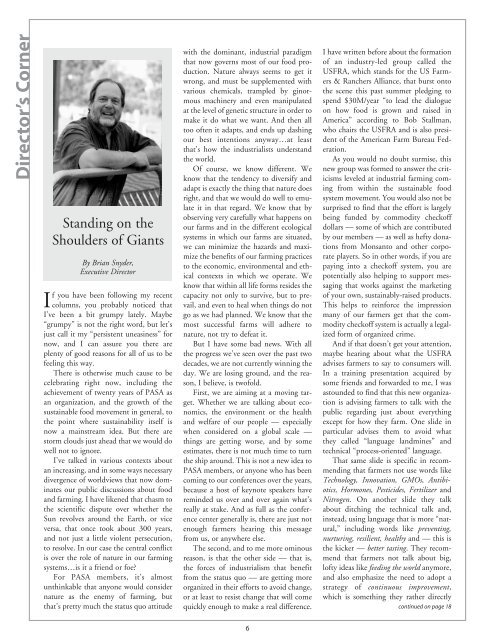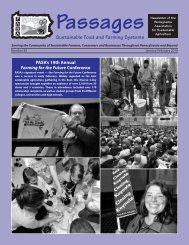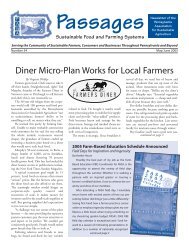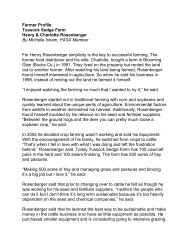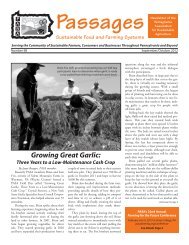Passages Sustainable Food and Farming Systems - PASA
Passages Sustainable Food and Farming Systems - PASA
Passages Sustainable Food and Farming Systems - PASA
Create successful ePaper yourself
Turn your PDF publications into a flip-book with our unique Google optimized e-Paper software.
Director’s Corner<br />
St<strong>and</strong>ing on the<br />
Shoulders of Giants<br />
By Brian Snyder,<br />
Executive Director<br />
If you have been following my recent<br />
columns, you probably noticed that<br />
I’ve been a bit grumpy lately. Maybe<br />
“grumpy” is not the right word, but let’s<br />
just call it my “persistent uneasiness” for<br />
now, <strong>and</strong> I can assure you there are<br />
plenty of good reasons for all of us to be<br />
feeling this way.<br />
There is otherwise much cause to be<br />
celebrating right now, including the<br />
achievement of twenty years of <strong>PASA</strong> as<br />
an organization, <strong>and</strong> the growth of the<br />
sustainable food movement in general, to<br />
the point where sustainability itself is<br />
now a mainstream idea. But there are<br />
storm clouds just ahead that we would do<br />
well not to ignore.<br />
I’ve talked in various contexts about<br />
an increasing, <strong>and</strong> in some ways necessary<br />
divergence of worldviews that now dominates<br />
our public discussions about food<br />
<strong>and</strong> farming. I have likened that chasm to<br />
the scientific dispute over whether the<br />
Sun revolves around the Earth, or vice<br />
versa, that once took about 300 years,<br />
<strong>and</strong> not just a little violent persecution,<br />
to resolve. In our case the central conflict<br />
is over the role of nature in our farming<br />
systems…is it a friend or foe<br />
For <strong>PASA</strong> members, it’s almost<br />
unthinkable that anyone would consider<br />
nature as the enemy of farming, but<br />
that’s pretty much the status quo attitude<br />
with the dominant, industrial paradigm<br />
that now governs most of our food production.<br />
Nature always seems to get it<br />
wrong, <strong>and</strong> must be supplemented with<br />
various chemicals, trampled by ginormous<br />
machinery <strong>and</strong> even manipulated<br />
at the level of genetic structure in order to<br />
make it do what we want. And then all<br />
too often it adapts, <strong>and</strong> ends up dashing<br />
our best intentions anyway…at least<br />
that’s how the industrialists underst<strong>and</strong><br />
the world.<br />
Of course, we know different. We<br />
know that the tendency to diversify <strong>and</strong><br />
adapt is exactly the thing that nature does<br />
right, <strong>and</strong> that we would do well to emulate<br />
it in that regard. We know that by<br />
observing very carefully what happens on<br />
our farms <strong>and</strong> in the different ecological<br />
systems in which our farms are situated,<br />
we can minimize the hazards <strong>and</strong> maximize<br />
the benefits of our farming practices<br />
to the economic, environmental <strong>and</strong> ethical<br />
contexts in which we operate. We<br />
know that within all life forms resides the<br />
capacity not only to survive, but to prevail,<br />
<strong>and</strong> even to heal when things do not<br />
go as we had planned. We know that the<br />
most successful farms will adhere to<br />
nature, not try to defeat it.<br />
But I have some bad news. With all<br />
the progress we’ve seen over the past two<br />
decades, we are not currently winning the<br />
day. We are losing ground, <strong>and</strong> the reason,<br />
I believe, is twofold.<br />
First, we are aiming at a moving target.<br />
Whether we are talking about economics,<br />
the environment or the health<br />
<strong>and</strong> welfare of our people — especially<br />
when considered on a global scale —<br />
things are getting worse, <strong>and</strong> by some<br />
estimates, there is not much time to turn<br />
the ship around. This is not a new idea to<br />
<strong>PASA</strong> members, or anyone who has been<br />
coming to our conferences over the years,<br />
because a host of keynote speakers have<br />
reminded us over <strong>and</strong> over again what’s<br />
really at stake. And as full as the conference<br />
center generally is, there are just not<br />
enough farmers hearing this message<br />
from us, or anywhere else.<br />
The second, <strong>and</strong> to me more ominous<br />
reason, is that the other side — that is,<br />
the forces of industrialism that benefit<br />
from the status quo — are getting more<br />
organized in their efforts to avoid change,<br />
or at least to resist change that will come<br />
quickly enough to make a real difference.<br />
I have written before about the formation<br />
of an industry-led group called the<br />
USFRA, which st<strong>and</strong>s for the US Farmers<br />
& Ranchers Alliance, that burst onto<br />
the scene this past summer pledging to<br />
spend $30M/year “to lead the dialogue<br />
on how food is grown <strong>and</strong> raised in<br />
America” according to Bob Stallman,<br />
who chairs the USFRA <strong>and</strong> is also president<br />
of the American Farm Bureau Federation.<br />
As you would no doubt surmise, this<br />
new group was formed to answer the criticisms<br />
leveled at industrial farming coming<br />
from within the sustainable food<br />
system movement. You would also not be<br />
surprised to find that the effort is largely<br />
being funded by commodity checkoff<br />
dollars — some of which are contributed<br />
by our members — as well as hefty donations<br />
from Monsanto <strong>and</strong> other corporate<br />
players. So in other words, if you are<br />
paying into a checkoff system, you are<br />
potentially also helping to support messaging<br />
that works against the marketing<br />
of your own, sustainably-raised products.<br />
This helps to reinforce the impression<br />
many of our farmers get that the commodity<br />
checkoff system is actually a legalized<br />
form of organized crime.<br />
And if that doesn’t get your attention,<br />
maybe hearing about what the USFRA<br />
advises farmers to say to consumers will.<br />
In a training presentation acquired by<br />
some friends <strong>and</strong> forwarded to me, I was<br />
astounded to find that this new organization<br />
is advising farmers to talk with the<br />
public regarding just about everything<br />
except for how they farm. One slide in<br />
particular advises them to avoid what<br />
they called “language l<strong>and</strong>mines” <strong>and</strong><br />
technical “process-oriented” language.<br />
That same slide is specific in recommending<br />
that farmers not use words like<br />
Technology, Innovation, GMOs, Antibiotics,<br />
Hormones, Pesticides, Fertilizer <strong>and</strong><br />
Nitrogen. On another slide they talk<br />
about ditching the technical talk <strong>and</strong>,<br />
instead, using language that is more “natural,”<br />
including words like preventing,<br />
nurturing, resilient, healthy <strong>and</strong> — this is<br />
the kicker — better tasting. They recommend<br />
that farmers not talk about big,<br />
lofty ideas like feeding the world anymore,<br />
<strong>and</strong> also emphasize the need to adopt a<br />
strategy of continuous improvement,<br />
which is something they rather directly<br />
continued on page 18<br />
6


